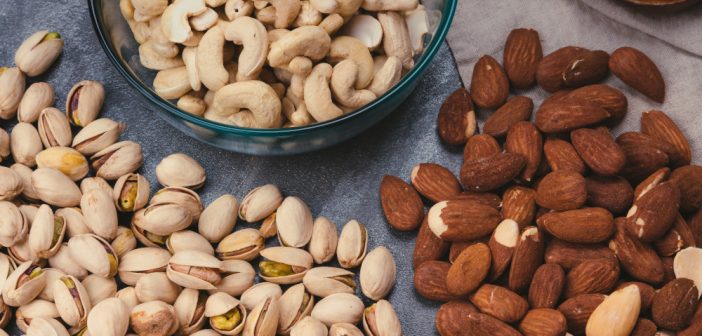What if I told you there is a food that is rich in nutrients, including protein, healthy fats, fibers, antioxidants, vitamins, and minerals, and can reduce the risk and symptoms of health conditions like diabetes, high cholesterol, heart disease, and stroke? No, this isn’t some magical cure-all that you have to import from a far-off country. In fact, these benefits lie in a common food that you might encounter regularly and take for granted: nuts.
While nuts are small in size, they are packed with nutrients that can tremendously benefit your health. Here is what you need to know about the health benefits of nuts, what types of nuts are best (and in what quantities), and how to easily incorporate them into your diet each day.
What are the benefits of nuts?
First off, nuts are an excellent source of many nutrients (of varying quantities depending on the nut):
- Protein
- Fat
- Fiber
- Vitamin E
- Magnesium
- Phosphorus
- Copper
- Manganese
- Selenium
In addition, although nuts are high in calories and fat—the good kind of fat—they actually help reduce cholesterol and triglycerides and can aid in weight loss. Further, they have anti-inflammatory properties and can reduce the risk and symptoms of chronic conditions, including type 2 diabetes, metabolic syndrome, heart disease, and stroke.
Another benefit is that nuts are loaded with antioxidants, which help fight oxidative stress and cell damage. Finally, the high fiber content works wonders for your gut health and digestive system. These are some of the primary benefits of nuts, but the positive effects that extend from these benefits can’t be counted.
What types of nuts are best, and how much?
Based on their nutrient content, the best nuts to eat are as follows:
- Almonds
- Pistachios
- Walnuts
- Cashews
- Pecans
- Macadamia nuts
- Brazil nuts
- Hazelnuts
- Peanuts
Visit this link for the recommended quantities of each nut per day. Try to incorporate a variety of nuts each day to diversify the nutrients you receive.
A word of caution: Be careful not to eat too many nuts. Certain nuts, such as Brazil nuts, contain trace vitamins and minerals that are dangerous in high quantities. Nuts are also dense in calories, so overindulging in nuts can lead to weight gain. Further, due to their high fiber content, increasing the amount of nuts you eat can cause gas if your body is not used to it, but that should improve over time.
In addition, be careful with the possibility of nut allergies. Nuts are some of the most common allergens, so, if you are unaware of any nut allergies, introduce them gradually and pay attention to any unusual symptoms you might experience.
How can you incorporate nuts into your diet?
Now, the next step is to find the best ways to include nuts in your diet. You can always snack on the nuts plain, but if you get bored with that and want more interesting ways to incorporate nuts into your meals, here are a few ideas:
- Add nuts (almonds, pecans, walnuts) to your breakfast cereal or yogurt.
- Sprinkle nuts on your favorite pasta dish.
- Make or buy a trail mix (which might include peanuts, almonds, pistachios, dried fruit, dark chocolate, and a form of whole grains).
- Add some crunch to your salad by topping it with nuts (pistachios, walnuts, pecans, cashews).
- Toss nuts (peanuts, cashews) into your stir fry.
- Spread nut butter (peanut, almond, cashew) on a sandwich.
- Incorporate nuts into your baked goods, such as cookies or bread.
Nuts are extremely versatile and can be a nice touch to nearly any dish. Feel free to get creative and try something new!
Nuts are a highly beneficial food that can improve your health in many ways. If you aren’t including nuts in your diet, now is the time to start. You now know the benefits, so go crazy—or should we say, “Go nuts!”
A version of this article was published by The Daily Herald. It has been republished here with permission.




